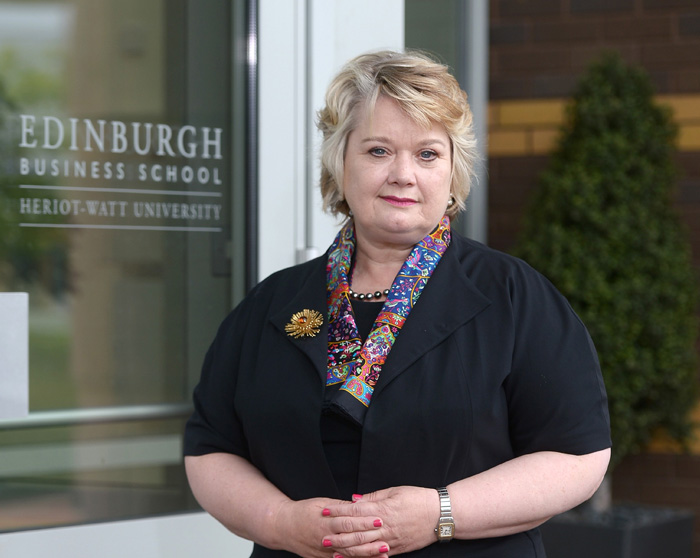'Business schools need to equip their students with human capital and social capital'
 |
Professor Heather McGregor is Executive Dean of Edinburgh Business School, the graduate business school at Heriot-Watt University. She is well known not only as a business leader and academic, but also as author of the weekly ‘Mrs Moneypenny’ column in the Financial Times, and articles in other publications. She has extensive experience in the capital markets in the UK and in Asia, and expertise in human resources, change management and in the global utilization of social networks. She is a co-founder of the 30% Club which campaigns to increase the number of women on boards, and a strong champion of diversity in the workplace. She was awarded a CBE in June 2015 for services to business, especially employment skills and diversity. She took time out of her busy schedule for an email interview with BrainGain Magazine recently.
Given your expertise on diversity, what would you say is the role of business schools in shaping the workplaces of the future?
Our role is to provide people with the tools they need to advance; those include both human capital, i.e. the technical skills of management, and social capital, i.e. the opportunity to build a network with people who will be able to support them. Business schools need to deliver both of these if they want to shape the workplaces of the future.
Why should companies care about the participation of women – how do they and their markets benefit?
As the old Chinese proverb goes, ‘Women hold up half the sky’. More importantly, according to research, they make half or more of all household purchasing decisions. Companies should therefore care that women constitute a major part of every market.
Does diversity affect higher education institutions in a similar way to corporations?
In terms of staff, it is not nearly so bad; that is because being an academic and being a mother are easier things to combine than being a CEO and a mother. I am a female dean of a business school, and about 25% of business school deans in the UK are women – 34 of us. Half of my senior leadership team are women. We recruit many more women as a percentage of our students than other Schools – our distance learning programmes allow people to start, stop, and take exams and progress, at their own time and their own pace, which is very appealing for women who want to study around a family and/or a job.
Could you tell us a little bit about how Edinburgh Business School promotes women’s participation in business?
We aim to equip women with many of the skills that they need to break through the so-called ‘glass ceiling’, notably a strong professional network and a personal brand. We have an especially designed course which encapsulates thirty units of company visits, meetings with business leaders and influencers, and the practical development of personal brand (including CV development and social media footprint) as well as formal training in how to build a network. These are many of the invisible barriers that face women as they build their business career, as outlined by me in my best-selling book ‘Careers Advice for Ambitious Women’.
Please tell us a bit about the School’s new MBA program in entrepreneurship – how is it different from the other programs?
Our programme is unique because it will offer a host of exciting initiatives, not least of which is an intensive, six-week study seminar in Dubai. Our students will be visiting companies both in the UK and the UAE, giving them a valuable insight into business issues from the vantage point of two different cultures. Our students will also experience company visits, guest speakers, and a final elective where they develop an investor-ready business plan. They will also benefit from one-to-one business mentoring while developing their plan.
What kind of funding is available to international students at Edinburgh Business School? Is it merit- or need-based?
At Edinburgh Business School we have developed a partnership with the 30% Club, dedicated to increasing female representation on company boards, to provide one fully-funded place on the new MBA programme with a focus on entrepreneurship. Female applicants must meet the School’s standard entry criteria and also applicants are required to write an 800-word essay on the topic ‘How will female entrepreneurs shape the future of global business?’
Do all students get opportunities for professional experience – for example, internships with companies in Edinburgh or elsewhere?
The full-time MBA programme is intensive and while there is no internship during the programme, students will enjoy a regular schedule of more than 20 company visits and guest speakers both in the UK and Dubai.
What are some of the other ways in which you support students and new graduates?
I will personally be developing a programme of career development masterclasses to run throughout the programme. These masterclasses will focus on personal skills development, encouraging and supporting students as they increase their global network of contacts, helping to give their businesses a competitive advantage.
The full-time MBA will not only stimulate creativity and entrepreneurialism but students who want to launch their own business will enjoy one-to-one business mentoring throughout the programme and leave with an investor-ready business plan.












